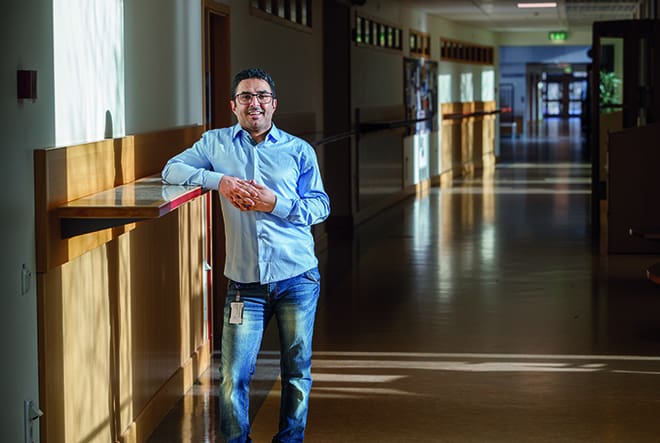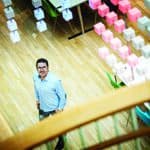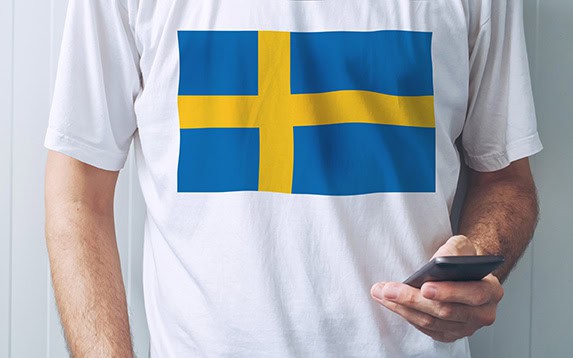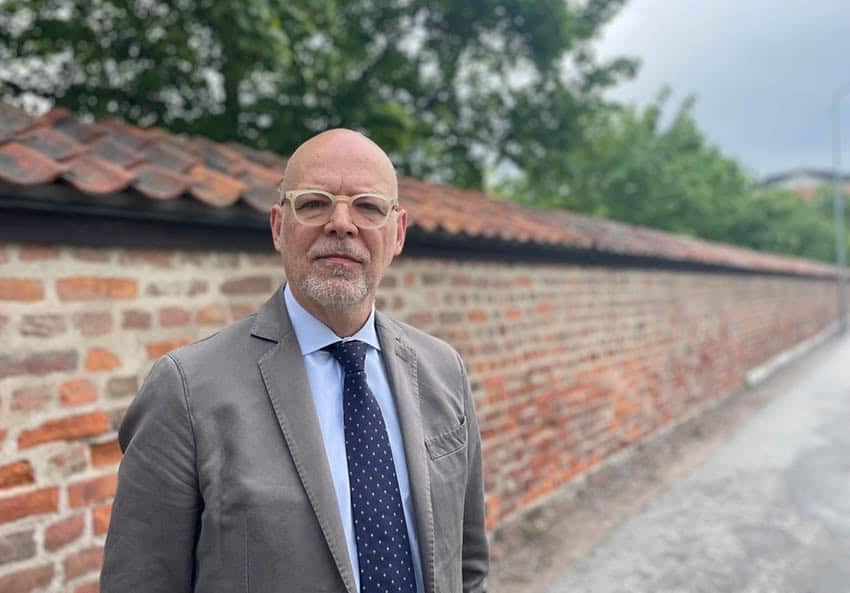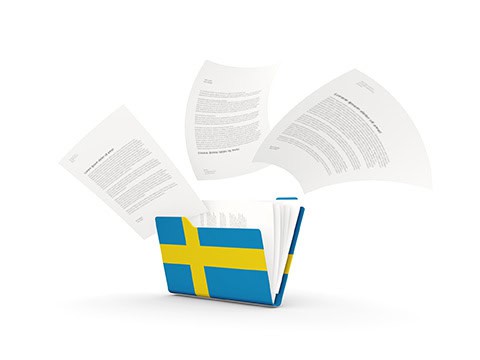Shelling is followed by massive bangs before a mushroom-like cloud of smoke and fire rises over Mount Nuqm in north-western Yemen. Mohamed Al-Sabri, a doctoral candidate studying biomedicine at Uppsala University, talks about how the scenes in the film clip are followed by stones, gravel and ash first being blown up the mountain by the impact and then rolling back with full force towards the house where he and his relatives live.
Mohamed Al-Sabri grew up just outside Yemen’s capital, Sanaa, and several members of his family are academics. He received his bachelor’s degree in pharmacy from the University of Aden 15 years ago and began working as a research assistant. After a year or so, he moved to an international food company, where he worked as a medical delegate on nutrition-related diseases.
Planned a way out
He then got a job at a multinational pharmaceutical company, before the civil war broke out in late 2014. Throughout the almost four years he spent in the raging war, he determinedly planned a way to get his family out of Yemen.
Even though Mohamed Al-Sabri had a job that – when the salary actually came – provided an income, the life situation was totally impossible. Not only for him, but for the entire population of the country – a situation that many still find themselves in today as the civil war continues unabated.
Every day was about getting ”over obstacles and through challenges”, as he describes it. Everyday life was spent in a society where electricity supply, water supply and infrastructure were completely wiped out. Sometimes he was given time off work because it was not possible to go out, and sometimes he had to try to get through his working day. All the time, life was uncertain.
“You could be stopped by the militia at any time,” he says, “and when you were, it was important to do as they said and not stand out. Otherwise you ran the risk of going off the grid, of disappearing.”
Decided to become a researcher
He decided to become a researcher in pharmaceuticals development, and he received a scholarship from the Swedish Institute to study biomedicine at master’s level in Sweden. The collapsed infrastructure and roadblocks meant that the journey to the airport alone took twelve hours. His ticket to Egypt – the first stop on the way to Sweden – cost half a month’s salary.
When he arrived in August 2017, a nervous wait followed. Two months later, his family followed. He was scared all the time. They moved into an apartment together in Skutskär, while Mohamed Al-Sabri studied for his master’s degree in biomedicine at Uppsala University.
Now he is in the first year of his doctoral studies and has a permanent residence permit, but the road to reach this point was not a straight one. SULF has helped him a lot, he says, and he lists all the documents and forms that were required for him to finally be able to get his permanent residence permit in December last year.
Permanent residence permit is important
One of the things that is required is an employment contract, and according to new rules that came into force in 2021, the criteria for being granted a residence permit for everyone in a family are assessed individually. This means that his children, who have now been here for more than three years, have also been granted permanent residence permits. Their mother, who has stayed at home while they were small, is still in Sweden on a temporary residence permit.
“She is a nurse, but she is now going to SFI and studying English in order to start studying to be an assistant nurse in Sweden. The plan is for her to be able to start working in a year. Only then can she get a permanent residence permit.”
And that is important, says Mohamed Al-Sabri.
“With a temporary residence permit, I live with the constant knowledge that my family and I can be sent home. There are examples of this happening in other countries. In Denmark they have now started sending people back to Syria who came to escape their civil war.”
“With a temporary residence permit, I live with the constant knowledge that my family and I can be sent home. There are examples of this happening in other countries. ”
The civil war that is still raging in Yemen was a result of the liberation that several of the countries in the region demonstrated for – or tried to demonstrate for – in the Arab Spring of 2011.
The Yemeni people wanted the same thing, but instead, a coup was followed by a civil war between mainly government-backed troops and Huthi rebel forces. Since then, the humanitarian situation in the country has been a disaster and the UN estimates that 20 million people are at risk of starvation if the war continues.
At the café by Fyrisån in central Uppsala, Mohamed al Sabri has waited a long time to start eating the baklava with a melon slice that he has on the plate in front of him. He starts chewing between sentences.
Will never go back
He thinks that he will probably never go back to Yemen. That is painful, because he misses it a lot, especially his parents and friends who are still there. He worries every day, but they are only in touch every couple of weeks. It is difficult to find a proper internet connection in Yemen that works for video calls, but if you have enough money, you can buy yourself a small amount of data to be able to surf sometimes.
“But then you really have to be quite rich,” says al Sabri.
Active in the union
Here in Sweden, he has become active in the union, and he was recently elected to the board of the SULF association at Uppsala University. He sees two things in particular as important in his union role: recruiting members for the organisation to grow stronger and working to bring about improvements to the work environment.
“In Sweden, the union has a much stronger mandate and power to change than the trade unions in Yemen have. It’s completely different. For the researchers who come here from other countries, it’s not always obvious that the union can help you with the things that I have received help with, such as residence permits and other matters outside work. I want to be part of ensuring that they get this information and support.”
Failed peace attempts
After several failed attempts, the UN succeeded in setting up negotiations between the Yemeni government and the Huthi rebels. The peace talks were held in Sweden in 2018, with the permission of the major powers Iran, which supports the rebel forces, and Saudi Arabia, which is behind the government’s forces. But so far there is no peace.
Mohamed Al-Sabri therefore hopes to be able to bring his parents to Sweden, but he does not believe that this will be possible under the existing rules. So when he has completed his doctorate, he and his family may move from Sweden, probably to the United Kingdom. He has study mates and friends who live and work there. Many have been able to be reunited with relatives and parents.
Might leave Sweden
In addition, he has found that it is difficult to get a job in the pharmaceuticals industry in Sweden without knowing the language. Although he knows Swedish and has no major problems with understanding and reading, there is still a long way to go before he can converse naturally and fluently.
That he is fluent in English, strangely enough, does not help much, he says.
“From what I know of the labour market, Swedish is more the norm in my particular industry. In the IT industry, you can get a job as long as you can speak English. For me, that has not been the case.”
“The union could have put more effort into counteracting the process at an earlier stage.”
There is therefore a risk that he will have to leave Sweden, even though he really likes it here. And although he wants to thank the union for many things, he says SULF could have been more proactive when it comes to the new migration law.
Waited to gear up
Now he feels that they waited until members were affected by the new rules before going up a gear to try to influence politicians.
“SULF has done a good job so far in making politicians and the Swedish Migration Agency aware of the problems with the legislation,” he says.
“But they should have had more foresight. The union could have put more effort into counteracting the process at an earlier stage.”
